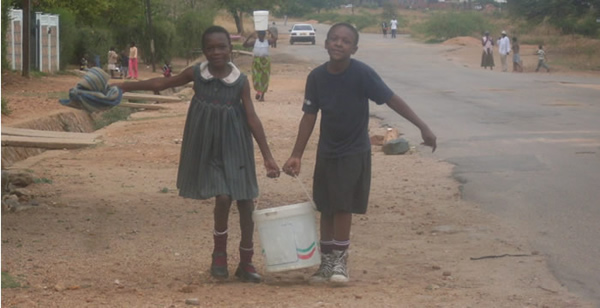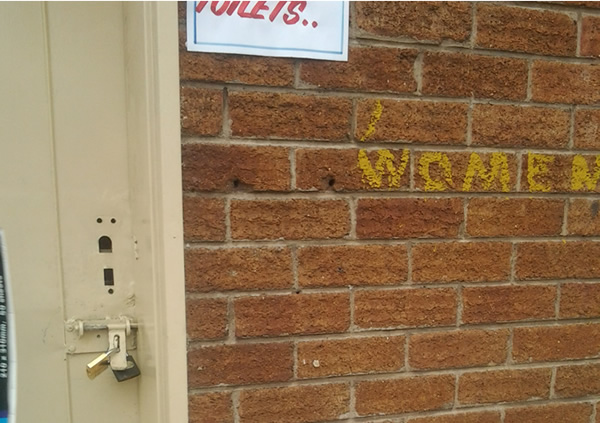| |
Back to Index
Where's
the water? Stories from Bulawayo - Page 5
Marko
Phiri and Chumile Jamela, Kubatana.net
November 2012
Previous
page
Sizinda
suburb
. . . need water? Go to the neighbouring township
Sizinda is one of the oldest suburbs in the city.
This is a former housing project for National Railways of Zimbabwe
employees built during the Rhodesia Federation, and like many other
so-called compounds, it's defining characteristic in over-population.
Only a few boreholes can be found here and residents have to go
to neighbouring Tshabalala to collect water.
Kondwani
Banda (aged 38) is a cobbler who plies his trade outside
a municipality beer hall. Where he sits, he faces the bush, or what
remains of it. "People have now become so daring that they
actually go to the bushes to relieve themselves in broad daylight,"
Banda says. They just look for a thicket a stone's throw away
from where he sits and then do their business. It has become a familiar
story that residents have turned to the bush to relieve themselves,
but what irks Kondwani is that people are doing it not far from
where he is sitting! When asked if he also uses the bushes, he takes
a long gulp from his scud, a potent brew of opaque beer, as if he
imagines that by the time he has finished drinking, I would have
forgotten the question I asked him! He simply wipes his moustache
and laughs it off.
Sizakele
Ncube (aged 51) is a teacher at one of the primary schools
in the suburb. The school has a borehole where children can drink
from when there is no water but the biggest worry for the school
authorities are the toilets. "The water crisis is especially
difficult in primary schools because even where there are boreholes,
these are not connected to the main water line and toilets,"
Ncube says. The teachers tell the students not to use the toilets,
but "you cannot forbid the children to use the toilets,"
Ncube says. "Without water it's just an invitation for
disease. It has become unbearable."

Gertrude
Pisirayi (aged 34) stays in Northend. This was once a middle
class, low-density suburb. But like many pre-independence formerly
"white suburbs" it has become something of a hovel.
Pisirayi stays with her family in a four-roomed cottage. She works
at a supermarket in the city centre, resting only on Sundays. She
says she has resorted to bathing at work; something she says is
an open secret at her workplace as everyone is doing it. In the
past she says using the workplace showers was rare, as employees
preferred the privacy of their home bathrooms. Not anymore she says.
"These are hard times," she muses. "Even my husband
washes up at work." Their two primary school-going kids have
a maid who stocks up with water when council water is available.
The main house has a borehole, but like many others in the area,
is dry. "The maid collects water and that's all that
matters," Pisirayi says. "But it is never enough. These
days it's hot at night and even if you want to take a bath,
you have think about the next day. Where will you get water? In
the end you do nothing to cool off," she says.
Zenzo
Moyo (aged 33) is a kombi driver in Bulawayo CBD. His kombi
rank is at TM hyper, one of Bulawayo's busiest commuter omnibus
ranks. Drivers, touts and commuters previously used the public toilets
at TM Hyper but now, because of the water shortages, the loos are
under lock and key. What is now available are pay toilets, at R5
per visit. "That's money I cannot afford," Moyo
says. "It means my tout also has to dip into the day's
takings to use the toilet and there is no telling how many times
one may want to use the loo," he says matter-of-factly. Typical
of these chaps known for all sorts of adventures and misadventures,
they have turned alleyways into latrines, creating an odour the
Devil would be proud of. "What do they (the municipality)
expect us to do? Paying to use a toilet for me is like paying to
drink water," he says, expressing a common sentiment.

Samuel,
David, Batsirayi, and Lloyd are National University of
Science and Technology (NUST) students. The four are part of a group
who live in a rented house close to the university campus. The water
shortages are one of the many headaches that have added to their
academic life. They have no large containers to store water, and
as Samuel says, it's become a huge hustle. "I have always
knew that university life would be tough, but I hadn't prepared
myself for this," he says referring to water cuts. "The
landlady says she is working on having a borehole sunk, but I have
a feeling this will happen only after we have gone." They
are all final year students, and as the semester begins, dissertations
and water are the most pressing issues in their young lives. "You
cannot have a situation where you live in a house where you share
the toilet with ten other people and expect the water that you keep
in zvigubhu to be enough for your needs," says Lloyd.
Note: Not their
real names
Previous
page
Download
full story
Visit the Kubatana.net
fact sheet
Please credit www.kubatana.net if you make use of material from this website.
This work is licensed under a Creative Commons License unless stated otherwise.
TOP
|

